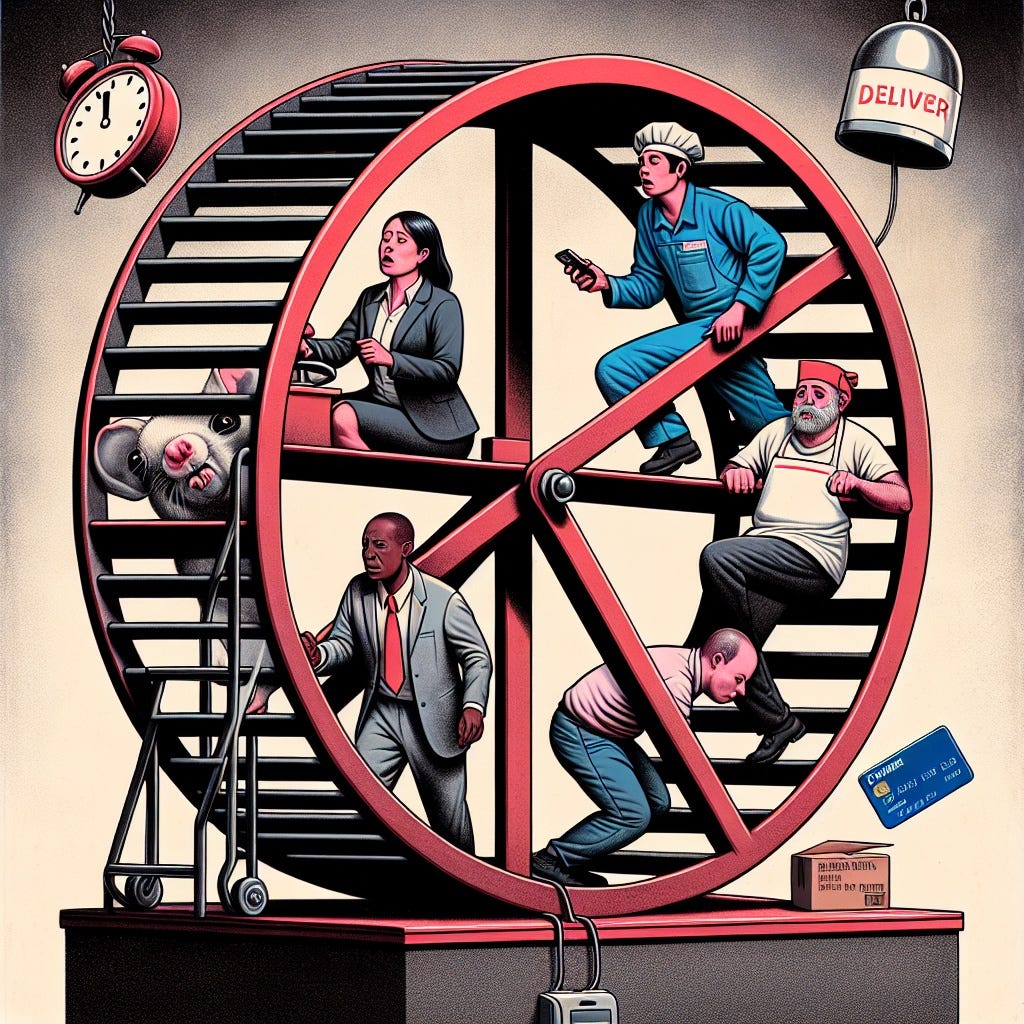What does work really mean?
Work is a complicated concept in our world and has been for a long time. In the bible, Adam was cursed to work the ground to obtain his sustenance after eating from the forbidden tree.
In Greek mythology, Sisyphus cheated death twice and was cursed by Zeus with the eternal labor of pushing a huge boulder up a hill where it would roll crashing down each time and require more pointless labor.
Now, pointless labor has become the point.
The economic world separated the concept of labor from work. The division of labor stripped work of joy and beauty. This was not limited to the industrial world, this division chopped up and is still chopping up every field it can.
Labor essentially has no meaning left other than a dollar earned. This is painful, but even more painful is the stark reality of having no labor and no currency to live by.
For many, labor is life.
Life in the age of mechanical reproduction
As Walter Benjamin noted in his 1935 essay, the ruthless nature of postmodern capitalism also robbed products and service of all their art, history, and value.
The only thing being made is money.
Of course, whether money can just be made is questionable. The overproduction of money causes a whole lot of racket and ruin.
True money with real worth should be tied to meaningful value. Today, that would be sustainable practices for producers consumers, and clean energy.
However, today’s financial market is built more on ego than economic order or efficiency.
For Adam Smith — creator of old-fashioned modern capitalism — reinvestment of profits into the creation of new wealth was a key principle.
He thought high profits denoted economic pathology.
I guess he was the kind of guy who wanted people to grow more fruit and eat it.
Arbeit Macht Frei
The 16-foot, 90-pound wrought-iron sign that hung outside the entrance to the Nazi-German concentration camp Auschwitz was tragically made by prisoners with mental work skills.
Arbeit Macht Frei means “Work Makes Free”, and this symbol was certainly a very cruel articulation of the camp’s deadly intention.
The question might be who exactly does work make free?
Although this period of history was uniquely horrific, the idea is not a new one. Work camps and hard labor are old concepts in military and prison worlds, and the idea of work as punishment is not limited to this application. Many incarcerated workers cannot refuse work without facing severe punishment and retribution including longer sentences and solitary confinement. Their work goes to increase the profits of major corporations. Many prisoners then face barriers to gaining legitimate work when they are released.
This is not limited to prison, of course.
Puritan principles
The New England Puritans played a key role in the establishment of American political values and culture. Their brand of Protestant theology emphasized hard work, frugality, and discipline and was equally disinclined towards idle time or frivolity.
However, both idle time and frivolity are key ingredients in creativity, imagination, design, and innovation. Although those terms have a negative reputation, all they really mean is freedom and fun.
Work is not merely labor.
It requires actual and metaphysical space.
I remember being shocked when I worked with a European company and learned that they all take the entire month of August off work. A vacation for everyone seemed unbelievable.
While a yearly sabbatical may be an impossible dream — at least for American work culture — real and frequent vacation is essential.
What is a real vacation?
Some people work so hard at their vacations that they need a staycation to recover when they return, but they probably never get it because the pressure to work is so strong, whether or not that habit is even productive or effective.
Going through those motions can be just like spinning in a wheel.
The choice and the ability to take a break can be a difficult. After a long and challenging situation, I love to go outside and enjoy nature on a walk or other adventure.
Being in nature and surrounded by plants, animals, water, and wind is the best way for me to truly disconnect from all the noise of the civilized world and that part of my own mind. At the same time, exercise, yoga, cooking, (and eating) are also great activities to transition from mental work and effort. I’m also starting to enjoy drawing and creating visuals.
These are all natural, physical activities.
Whether my heart is full of joy, grief, or brimming over with a little bit of it all, nature is the best place to let it out. Both laughter and tears are welcome. Nature is way too ancient, big, and wise to ever be frightened of my thoughts or feelings.
I listen carefully to what the natural world has to say, and always come away with some new insight and serenity.
Unlearning to play
True play is about novelty, change, risk, and discovery. This requires an open-mindedness and willingness to test new ideas, approaches, and situations.
The biggest risk is letting go of a belief or idea that I am attached to. Once you start that process, there really is no end because it is all a huge, interconnected network.
Play is totally experimental, but not entirely divorced from logic or analysis. Play is about wiping the screen clean or at least reducing it to a few meaningful ideas or limits.
Can any labor be play? That is an excellent question on a larger scale. I’m not so sure about that, but I know in my own life, when I choose play over labor I create more value.
How about you?





